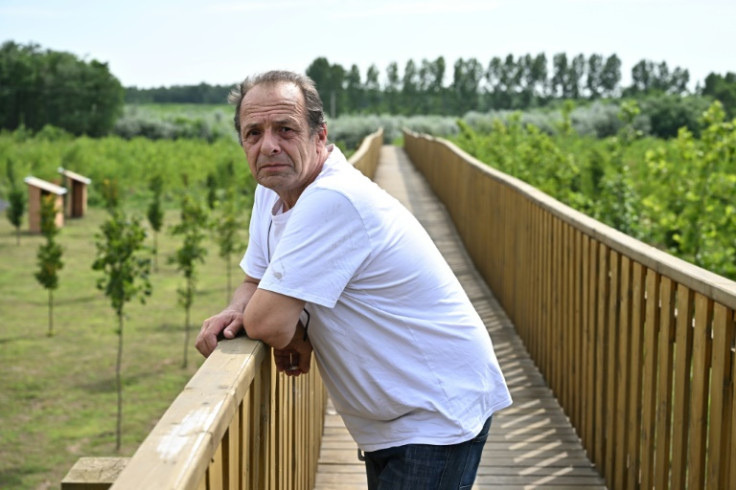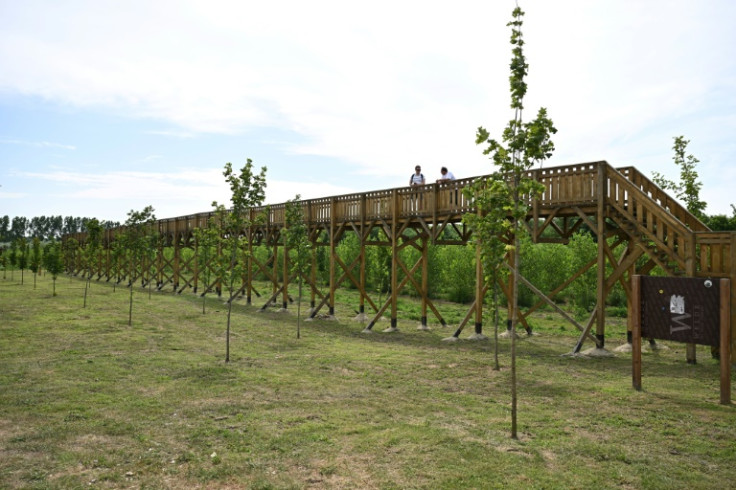Tree-less Canopy Walkway Shines Spotlight On Hungary Graft

It should have been a forest canopy walkway -- but instead it is a bridge above an expanse of saplings and open fields.
The project in the Hungarian village of Nyirmartonfalva -- built under an EU-funded, now corruption-accused programme -- showcases the deep-seated problem of graft and waste as the country takes on the bloc's rotating presidency from Monday.
"It is a stunning visual representation of the process, which has been ongoing for more than a decade, of how Hungary has been stealing and squandering EU funds," Akos Hadhazy, an independent MP known for his anti-corruption work, told AFP.
Since nationalist Prime Minister Viktor Orban's return to power in 2010, Hungary has fallen from 50th to 76th place in Transparency International's corruption perception index, ranking last among EU members in 2023.
During the same period, Orban's inner circle has grown spectacularly wealthy from public tenders -- from his confidant Lorinc Meszaros to his son-in-law Istvan Tiborcz who now control large swathes of the economy.
And Brussels has frozen around 19 billion euros ($20 billion) in EU funds earmarked for Hungary over alleged corruption in public procurement, among other issues.
The central European country claims Brussels is withholding the funds to pressure it over its self-described "illiberal" transformation and denies corruption accusations.
The Nyirmartonfalva 80-metre (90-yard)-long walkway became infamous overnight last year after a report by investigative site Atlatszo went viral.
The report sparked a graft investigation and led to journalists, opposition politicians and even US Ambassador David Pressman to descend on the remote 2,000-people village near the Romanian border.
"Quite a view!" Pressman -- who has warned of corruption's "corrosive effect on democracy" and urged Hungary to address it -- wrote on X in January, posting photos of him at the site.
One of the whistleblowers, pensioner Zoltan Palfy, told AFP that some villagers still refuse to greet him on the streets, angry about their village's sudden notoriety.
The structure's saga started when entrepreneur Mihaly Filemon applied for an EU grant under a Hungarian rural development programme to build a canopy walkway on his land.
After winning a pledge in 2021 to get 64 million forint (160,000 euros or $170,000), Filemon -- by then elected mayor with the support of Orban's Fidesz party -- proceeded with the construction.
But as inflation pushed up prices, Filemon decided to cut down the forest and sell the wood to finance the work -- resulting in the canopy-less walkway.
"There was no need to have a forest here. The forest will grow. As you can see, it has already grown," he told AFP when met at the walkway last week, pointing at the tree saplings now planted around the site and blaming the tender for not specifying a minimum height for the surrounding trees.
A 10-month-long corruption investigation, meanwhile, found serious irregularities -- including signs of collusion, overpricing and favouritism -- in the EU-funded, Hungary-managed development programme, under which the walkway and other projects have sought funds.
The probe was led by the country's anti-graft watchdog, the Integrity Authority, which was set up in late 2022 under EU pressure to prevent misuse of the bloc's funds.
The organisation has filed a criminal complaint, as it does not have the competency to wrap up the case itself. No money has as yet been given to Filemon.
Besides the financial losses, Filemon attributed his defeat in June's municipal elections to the scandal.
Graft fighter Hadhazy accuses authorities of "covering up" cases of top-level "systematic" corruption under Orban.
"In practice, only very exceptional corruption cases are prosecuted in Hungary," the opposition politician noted, adding that Fidesz's dominance over media limits potential electoral consequences on a national level.
"The propaganda machine can conceal 'inconvenient facts' from millions of people, or divert attention from them," he said.
Hadhazy also dismissed the Integrity Authority as a "dummy institution" as it does not have power to prosecute.
Its president, Ferenc Biro, recently requested an extension of the agency's legal powers.
"I consider it imperative for the authority to be able to investigate corruption cases independently and to impose sanctions," Biro told AFP.
But critics think this is unlikely to happen.
Instead, investigative site Atlatszo and the Hungarian branch of Transparency International have both come under probe by a controversial new agency set up to curb foreign influence.


© Copyright AFP 2024. All rights reserved.




















